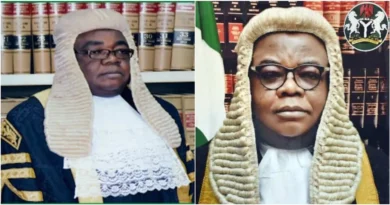Illegal Trading, Scavengers: Federal High Court Dismisses Opposition to FCTA Crackdown in Abuja
By Raheem Ibrahim
A legal attempt to stop the Federal Capital Territory Administration (FCTA) from removing destitute persons, beggars, and illegal traders from Abuja has failed, as the Federal High Court (FHC) dismissed the case.
The lawsuit, filed in November 2024 by Abuja-based lawyer Abba Hikima, sought to enforce the fundamental rights of homeless persons, scavengers, beggars, and street traders. He argued that arrests, harassment, and detentions carried out under the directive of FCT Minister Nyesom Wike violated constitutional provisions on dignity, liberty, and freedom of movement. Hikima also demanded N500 million in damages.
However, the FCTA recorded a pivotal legal victory on July 11, 2025, as the Federal High Court dismissed the N500 million lawsuit challenging its ongoing crackdown on street scavengers, beggars, and illegal traders in the city.
The decision has been widely hailed by security experts and law enforcement agencies as vital to restoring public order, safeguarding infrastructure, and curbing urban criminality.
Reacting to the judgement, the Commissioner of Police, FCT Command, Adewale Saka Ajao, welcomed the verdict, saying:
“The judgement is a boost to police efforts to curb vandalism of public infrastructure.”
In its ruling, the court sided with the FCTA and other respondents, stating that granting the reliefs sought would turn Abuja into “a haven of all sorts of unwanted and unwholesome activities.”
The verdict comes just days after the launch of Operation Sweep Abuja Clean, a citywide campaign led by Minister Wike aimed at eradicating public nuisances and criminal hotspots. The operation targets scavengers, beggars, and illegal street traders—groups authorities say often provide cover for “One Chance” robbery gangs and other urban crimes.
Commenting on the ruling, FCT Minister Nyesom Wike emphasized:
“Our nation’s capital should be a secure symbol of pride and beauty, not a site for street beggars and scavengers, many of whom are agents of criminal elements.”
It will be recalled that a joint task force—comprising the Nigeria Police, Civil Defence, State Security Services, and various FCT agencies—was authorised to apprehend individuals engaging in unsafe and unlawful activities. Detainees are profiled and repatriated to their home states for further management.
CP Ajao hailed the court’s decision as a win for law-abiding residents.
“This move is not just about enforcement; it is about reclaiming the capital for citizens,” he said. “The judgement is not a personal victory for the Minister but a collective gain for residents who have suffered at the hands of those hiding behind poverty to commit crimes.”
Security analysts have observed a notable decline in manhole theft—a major hazard and economic burden—since the crackdown intensified. Previously, open manholes had led to numerous vehicular accidents and expensive repairs.
Experts insist that unregulated scavenging and begging have long facilitated theft, vandalism, and organized crime, posing serious risks to public safety and urban governance.
They stress that continued enforcement is necessary to curb these activities and uphold the Abuja Environmental Protection Act, which empowers authorities to maintain cleanliness, order, and safety.
The court’s decision has now clarified the government’s authority to act decisively, strengthening the fight against vandalism and reinforcing the FCTA’s commitment to a secure and orderly city. For the administration, the legal endorsement of the FCT scavenger crackdown marks a major step in reclaiming Abuja from elements that threaten its safety and image.




